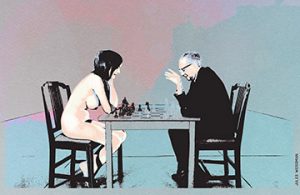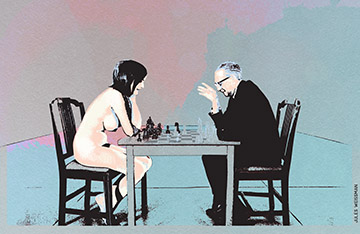COLUMN | By Bret Bradigan
Eve Babitz’ Ojai
Editor’s note: Due to the pandemic, this is the first spring since 1947 without an Ojai Music Festival. In lieu of our usual coverage, we present this charming piece about the 1994 festival by the celebrated writer Eve Babitz, who passed away in December, and whose father was among the event’s founders. This piece originally appeared in Westways magazine in June 1995 with the title “Keeping Time in Ojai,” and it was included in “I Used to Be Charming,” a collection of Babitz’s journalism published last fall by New York Review Books. Reprinted here with permission. To order the book (and other Babitz titles, such as “Eve’s Hollywood”) visit www.nyrb.com.

A Jules Weissman illustration of the famous Julian Wasser photo of Eve Babitz playing chess with Marcel Duchamp.
By Eve Babitz
In the 1994 Ojai Music Festival Playbill, Michael Tilson Thomas, the musical director, wrote: “I can clearly remember the clear, dusty California days, shadowed by live oak and sycamore with the music and presence of Ingolf Dahl, Igor Stravinsky, Aaron Copland, Lukas Foss, Alice Ehlers, Sol Babitz, Mel Powell, and Pierre Boulez, to name but a few …” My father, Sol Babitz, was the first violinist in the orchestras then, plus one of the originators of the Ojai festival, which he loved because they played interesting and early modern music.
Tilson Thomas was dedicating this festival to his memory of earlier times, times I too remember, though I cannot remember when I first went to the Ojai music festivals because I was too young, but I remember that every year, around April or May, my father would get out these various sheets showing an orchestra’s seating arrangements for different pieces of music, and he’d be on the phone, day and night, acquiring musicians to fill those seats – and the great ladies of Ojai would allow these musicians and their children to come stay during the festival weekend, so what I remember first, being one of the children, was the lane scented with orange blossoms and honeysuckle as we drove to Mrs. Grant’s house. She was a classical kindly old American lady with spectacles, with a beautiful old bungalow house with a stone porch, filled with remnants of travel in China, like a ruby-handled letter opener. She had an orange grove behind her house and something of a farm with chickens and cows too; it was paradise, a house inside full of books and culture, and outside the Country in the way old California was “country.” And in the backyard, she always had kittens that my sister and I considered just further evidence that the best place on earth was Ojai.
In the mornings, Mrs. Grant would make my sister and me fresh orange juice and cinnamon toast and then we’d go play with the kittens and we definitely hated being dragged to concerts and considered one of the fabulous things about being an adult that we’d never have to go to a concert again.
In later life, what I loved about concerts was the intermissions where you could find great funny people that talked a mile a minute and were deeply civilized, but still to this day, the idea of being stuck, having to sit through a concert, drives me somewhat over the edge, though once I’m there, I usually find something funny enough or transcendent enough or amazing enough to capture my imagination, at least for a few moments.
Last year, my friend Paul Ruscha and I drove up to Ojai and stayed for two nights, not with Mrs. Grant, who is now, alas, dead and her home but a sigh in my memory, but at the fabulous Ojai Valley Inn, which has lately undergone a $35 million makeover and is now a place transcendent among golf fanciers, though even for the ordinary person, the lanes lined with honeysuckle and the balconies of jasmine are a thrill, as are the great birdcages outdoors filled with spectacular parrots and various other things and the indoor birdcages filled with gorgeous chirpers too. For breakfast, their open buffet is so decadent that Paul could hardly walk after actually eating eggs Benedict, which is I guess is OK since I’m his sole beneficiary though if I weren’t, I’d rather he stick to the oatmeal and all the great fruit they had as well as the divine muffins and incredible waffles with maple syrup. (On Sundays they actually had blintzes, which for a Republican-type golf place is amazingly Jewish.)
Ojai today is almost exactly like it used to be, the corner with the pharmacy where I used to buy books when I was little is still the corner with the pharmacy and nothing in the town has been allowed to go the least bit slick – there are no malls, no gigantic discount drugstores, no “improvements” that wreck life and make you think California isn’t that great after all.
If nearby Santa Barbara is the bastion of hidebound city planners absolutely refusing to allow anything but exactly what’s already there to be built again and so determined that the city never even take so much as water from Los Angeles so it won’t have to pander to ignorant nouveau “improvements,” then Ojai is equally bent on quaintness, though being inland and farther away from the hoi polloi, its got a gentler, quainter, sweeter grace that, still today, is exactly as marvelous as it must have been in the 1920s when it became somewhat of a town and definitely as it was in the early ‘50s when I remember my first concert rehearsal, for Stravinsky’s L’Histoire du Soldat conducted by Edward Rebner, which included a kind of theatrical event, the devil, the soldier with his violin (my father played that part), and the princess – and the devil jumped out from under the bed, giving me nightmares for years and years afterward.
When Paul and I went to the concerts, we sat in the front where I never sat before, since in the olden days when we were children, it was better sitting out on the lawns with picnics and others equally uninterested in music and more interested in the birds or the stars at night. They played a Lukas Foss piece, described as “ungirdled silliness” or something in the Playbill, which did make everyone laugh because it was like Bach only with sampling, things stuck in like Spike Jones did. It was so wild and funny. Sitting way up front, it was practically like being in the orchestra yourself, and it’s great that only about 800 people can fit into this bowl because it’s possible not only to park but also to get the feeling that you’re in something personal and special, rather than the way most concerts are today, where it’s so computerized and vast, you can’t wait for the intermission to go stare at people in their clothes.
The clothes at this concert were mainly khakis, walking shoes, sweaters and pants, nobody was dressed amazingly, but then it was all outdoors and cozy and inspired and brilliant anyway, the way the originators like my father and John Bauer hoped it would be, and the way Mrs. Grant and the other wonderful ladies of Ojai long ago imagined – civilization in the country, a perfect combination, a divine melding of the outdoors and the very, very sweetly cultivated – one of the great things about living in Southern California as it started out to be, and somehow still manages to be.
The tug-of-war that goes on within me about sitting through concerts at all, and the feeling that concerts are really the most sublime thing on earth and probably ought to be gone to as much as possible, still causes me trouble, but if you have to go to a concert, it’s probably most wonderful to go to these in Ojai, held in June, under the stars or gentle shade, hearing a young orchestra filled with technique and spirit and enthusiasm, and with the least expensive seats, the ones on the lawn behind the small bowl, where you can eat your picnic dinner and be there but not too there, the perfect way to hear music on a soft California lawn, the air perfect, the people gentle, civilized and kind as the avant-garde used to be and still, today, is.
Between concerts, we went to Suzanne’s, this elegant place, except that it was too early for us to have dinner, so we just had gazpacho, and I had iced tea, Paul had a beer. Later, in Santa Barbara, we went to a cute French restaurant called Mousse Odile, where for the first time in the years since I went to Paris, I found celery root just like it’s supposed to be, perfect, and the best bread on earth too. Even the coffee was so great, Paul bought some to take home with him, but then Santa Barbara has always had secret great places, and one of its secrets is that that 25 miles inland is Ojai with its orange groves, music festivals, and the beauty of country life lived in the grand manner of people who want to be out where they can see stars at night, but not that out.
Wherever Mrs. Grant is, I hope she’s in a place as divine as her farm in Ojai, but I doubt anything could be more divine than the place I remember, the kittens, the ruby-handled letter opener from China, and the cinnamon toast.


Leave A Comment